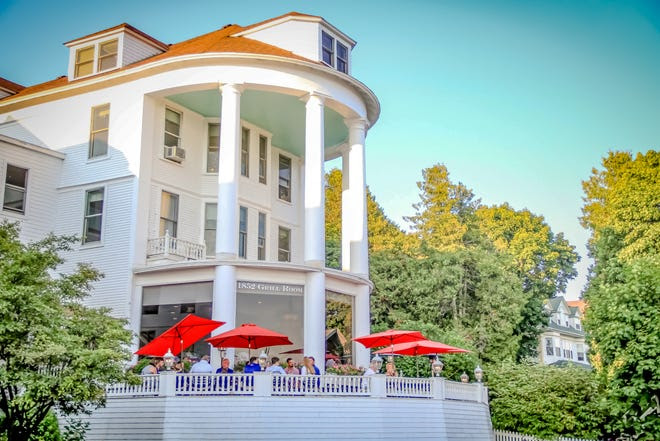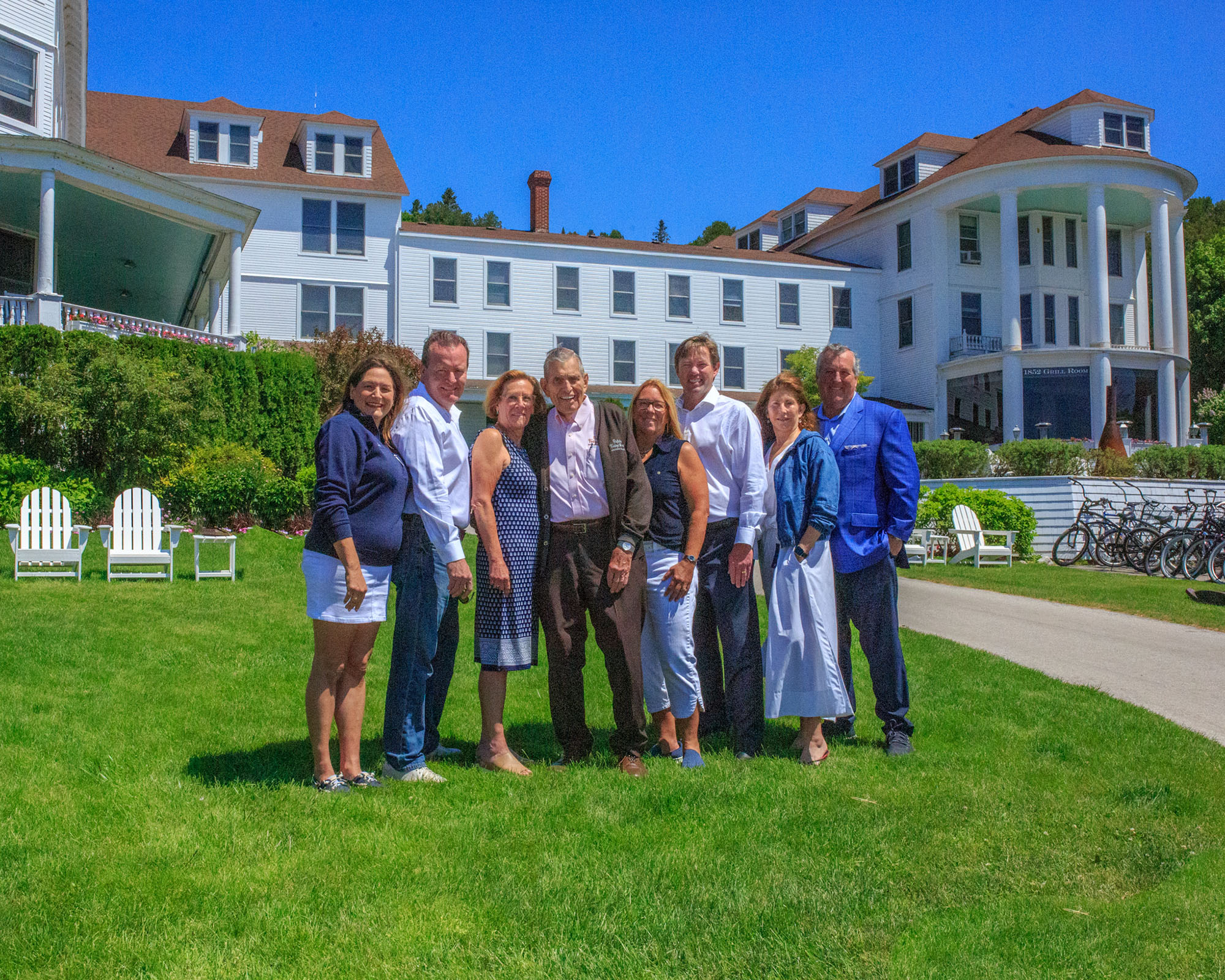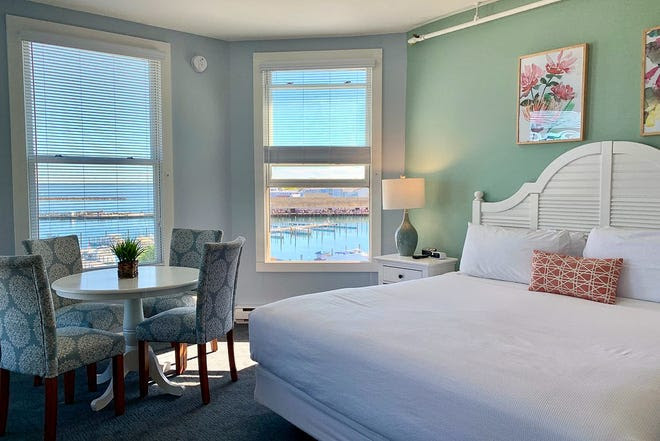Island House Hotel boasts a half-century of loving stewardship
Share
Array
(
[networks] => Array
(
[0] => facebook
[1] => pinterest
[2] => linkedin
)
[has] => Array
(
[facebook] => 1
[twitter] =>
[instagram] =>
[pinterest] => 1
[houzz] =>
[linkedin] => 1
)
)

About a half-century ago, a Detroit family looking to expand its business footprint on Mackinac Island signed a lease to operate and renovate one of the island’s oldest summer hotels, a dilapidated and long-abandoned structure that was facing demolition.
Since then, the Callewaerts — the same family that owns Ryba’s Fudge Shops and other Mackinac landmarks — have remained stewards of the restored Island House Hotel, preserving its historical integrity through various renovations and additions.
“We’ve had over 2 million people go through the place — for a small hotel, that’s a neat little thing to say,” said Todd V. Callewaert, president of the hotel and fudge shops. “However, over the years, we’ve been able to keep the same bones and structure of the hotel. We’ve wanted to make sure it stayed a historical property. That was important to us.”
For their efforts, the Callewaert family was recently recognized as Legendary Family Historic Hoteliers of the Year by Historic Hotels of America, a program of the National Trust for Historic Preservation. One of a series of awards announced each year, the accolades honor hotels that “have maintained their authenticity, sense of place, and architectural integrity.” The family has been nominated for the award several times, most recently in 2019.
“For four generations, Callewaert family members have been exemplary stewards of Mackinac Island tourism. This recognition is more than deserving,” said Tim Hygh, executive director of the Mackinac Island Tourism Bureau.
The 2020 honored hotels and hoteliers were selected from more than 250 nominees, received from historic hotels, historic preservation supporters, prior award recipients and leadership from Historic Hotels of America and Historic Hotels Worldwide. Historic hotels are inducted into Historic Hotels of America based on their historical significance and record of preserving authenticity, sense of place and architectural integrity.
“The nominating committee recognized the unique contribution of the Callewaert family over the past 50 years,” said Larry Horwitz, executive vice president of Historic Hotels of America and Historic Hotels Worldwide. “Through the family’s multi-generation commitment to the historic preservation of Island House Hotel, its history, architecture, and stories, travelers are able to experience this iconic hotel that dates back to 1852.”

Horwitz said it’s not uncommon for generations of the same family to operate a historic hotel. Among the historic hotels being run by descendants of the original owners are: The Lodge at Nemacolin Woodlands Resort in Farmington, Penssylvania, the Mohonk Mountain House in New Paltz, New York, and The Peabody Memphis, Memphis, Tennessee, and The American Club, Kohler, Wisconsin. Until recently, Mackinac Island’s Grand Hotel had been owned and operated by the Musser family.
The Island House opened as a three-story, wood-frame hotel on the island’s waterfront in 1852, about the time Mackinac began emerging as a summer tourist destination. Other hotels from that era are long gone. A few years later, the Island House was moved back 300 feet to its present location on the opposite side of the main road, allowing for expansion and offering guests postcard-worthy views of the harbor. The hotel’s distinctive east and west wings were added in 1895 and 1912.

Located about a block from Mackinac Island’s Victorian-era downtown, the Island House operated as a hotel well into the 20th century, under various owners. The Mackinac Island State Park Commission assumed ownership of the property in 1948. The last tenant was a Switzerland-based international peace organization that ended its lease in 1949. The building sat vacant and neglected until the Callewaert family came along.
By the time the Callewaerts agreed to lease the Island House, the family had established firm roots on the island. The family purchased the Lakeview Hotel a few years earlier and began making fudge — Ryba’s Fudge Shop — from a Main Street storefront as well. Todd Callewaert’s grandfather, Harry Ryba, is credited with spurring the island’s fudge industry to new heights. His marketing innovations included relocating fudge-making tables to the front window and using fans to spread the sweet aroma out to the street, to entice tourists.
The Island House appealed to the family’s growing business operations because of its bicycle rental licenses. The hotel had 400 of them; proprietors were required to have a license for each rental bike, one of the traditional modes of transportation on the nearly 4-square-mile island, which banned motorized vehicles in 1898.
Reopened in 1972, the Island House retained its distinctive architectural elements, including the circular porch and columns, porch spindles, and gables. The 200-room hotel was reconfigured to 98 guestrooms, each with a private bath. The community bathrooms were eliminated. The hotel did reopen without some modern conveniences, phones, TVs, and air conditioning, but they were eventually added.
“We pulled out the phones last year because nobody uses them anymore,” Callewaert said. “Everybody has cell phones. It’s funny how things change.”
The hotel expanded in 1995, with a 5,400-square-foot addition that included an indoor pool, hot tub, sauna, three suites and the Ice House Bar & Grill, named after the island’s oldest ice house, located on the northwest corner of the hotel property.
A $4 million refurbishment begun in 2019 continues this year with a focus on the lobby and three two-bedroom suites. The other 91 guest rooms in the 37,000-square-foot hotel have been refreshed with fresh coastal casual decor, hardwood floors, lighting upgrades, and high-speed WiFi. New tiling, granite vanities and bathroom fixtures were among the upgrades in bathrooms.
“The hotel definitely needed a refresh. We went through and renovated every part of every room,” Callewaert said. “It’s turned out really well according to our guests.”
Historic hotels like the Island House and others across the country are great economic contributors to their local communities, Horwitz said. They also preserve significant architecture, heritage, history and culture.
“Historic hotels have contributed greatly to our nation’s culinary history, sports heritage (sites of some of the most historic golf courses), botanical heritage (many with historic grounds and gardens dating more than a century), literary heritage, the start of famous art collections, and as sites of famous movies,” he said.
Callewaert was both honored and surprised by the recognition.
“The honor is not just for our family but the people who work for us, too,” he said, adding the hotel has a roster of long-time employees. “They’re like family too. That’s the reason we’re successful. We draw energy from them. Take good care of them and do what’s right, and you’ll be okay in life. That’s how we do things.”
The historical legacy is important, too.
“I think for history’s sake it’s important to take care of a hotel like Island House,” Callewaert said. “You tie island history with your family history and you’ve made a mark on history. We’ve only been at it 50 years but there’s a ton of history on the island. You’re a part of that and that leaves a legacy.”


